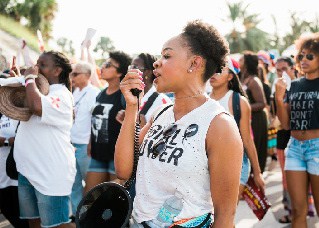Aerial Highway Alert at Caribbean Meeting
CASTRIES, St. Lucia – The World Bank and other multilateral organizations should start looking at airlines as “aerial highways” in the developing world and start supporting them, asserted the head of a development agency.
Lelei LeLaulu, president of Counterpart International, told delegates to the Caribbean Media Exchange (CMEx) on Sustainable Tourism at Coco Resorts in St. Lucia, that rather than complaining about the cost of keeping airline companies aloft they should be encouraging governments to nudge the major multi-lateral funding institutions into treating airlines as the “highways of the skies” which enable developing nations to fly in tourists and fly out goods and services to world markets to keep economies strong.
“Besides, when was the last time you heard people complain about the cost of a terrestrial highway,” he asked. “What we need is a new way of thinking about airlines. It is not a luxury for the elites – airlines connect families, enable small farmers and businesses to survive by selling their products abroad. Without this access to global markets via airlines most nations will remain mired in backwaters of the world economy.”
“The World Bank has had no problem building trillions of dollars of terrestrial highways which have been the key to growth in the poorer countries,” he said. “Now it is time to deal directly with the greatest inhibitor to growth for developing nations – their geographical isolation and lack of regular airlift. We really do not have the time to bleat about subsidies for airlines – we need to start promoting the need for protecting and strengthening our ‘aerial highways’ to ensure every nation can benefit from the huge growth of world travel.”
LeLaulu said in the United States, the government gave the US carriers billions of dollars to keep them solvent “because they know well the direct links between keeping the skyways open and a vibrant economy.” Hundreds of millions of dollars, he added, were spent providing air service to isolated communities in the US by the Federal Government.
Tourism is the lifeline of most countries and airlift was crucial to the survival of their economies. “We are now looking at 800 million arrivals worldwide,” he asserted, “and it is the responsibility of the international community to ensure there is a level playing field for those wishing to host some of those travelers. Unless there was a concerted effort to keep the “aerial highways” open, he cautioned, “the poor will just get poorer and the richer countries, with their subsidized airlines, will just get richer.”
Organizations like the World Bank can use its massive intellectual resources to find ways of “de-colonialising” air transport systems. “Why is that we have to fly through a former colonial capital to get to an African country? The air transport systems were designed by colonial powers and little has been done to re-structure routes to suit Africans”.
Vincent Vanderpool-Wallace, Secretary-General of the Caribbean Tourism Organization, the Caribbean’s tourism development agency made up of 32 governments plus major corporations, said “when bridges are built to link islands you don’t hear questions about whether they are making a profit”, as he joined the call for recognition of the need for consolidated regional action on “aerial highways.”

